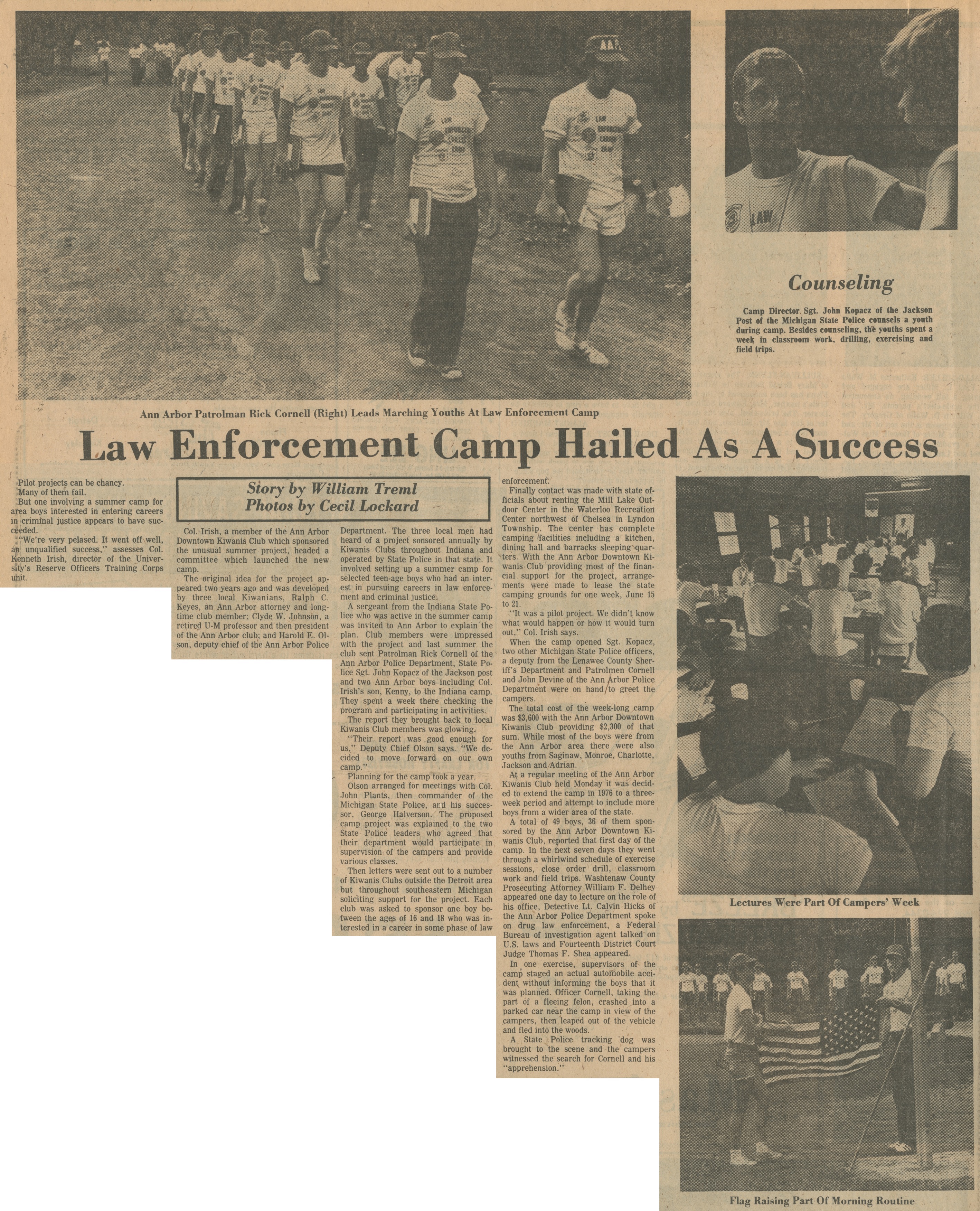Law Enforcement Camp Hailed As A Success

Law Enforcement Camp Hailed As A Success
Story By William Treml
Photos By Cecil Lockard
Pilot projects can be chancy.
Many of them fail.
But one involving a summer camp for area boys interested in entering careers in criminal justice appears to have succeeded.
"We're very pleased. It went off well, an unqualified success," assesses Col. Kenneth Irish, director of the University's Reserve Officers Training Corps unit.
Col. Irish, a member of the Ann Arbor Downtown Kiwanis Club which sponsored the unusual summer project, headed a committee which launched the new camp.
The original idea for the project appeared two years ago and was developed by three local Kiwanians, Ralph C. Keyes, an Ann Arbor attorney and longtime club member; Clyde W. Johnson, a retired U-M professor and then president of the Ann Arbor club; and Harold E. Olson, deputy chief of the Ann Arbor Police Department. The three local men had heard of a project sponsored annually by Kiwanis Clubs throughout Indiana and operated by State Police in that state. It involved setting up a summer camp for teen-age boys who had an interest in pursuing careers in law enforcement and criminal justice.
A sergeant from Indiana State Police who was active in the summer camp was invited to Ann Arbor to explain the plan. Club members were impressed with the project and last summer the club sent patrolman Rick Cornell of the Ann Arbor Police Department, State Police Sgt. John Kopacz of the Jackson post and two Ann Arbor boys including Col. Irish's son, Kenny, to the Indiana camp. They spent a week there checking the program and participating in activities.
The report they brought back to local Kiwanis Club members was glowing.
"Their report was good enough for us," Deputy Chief Olson says. "We decided to move forward on our own camp."
Planning the camp took a year.
Olson arranged for meetings with Col. John Plants, then commander of the Michigan State Police, and his successor, George Halverson. The proposed camp project was explained to the two State Police leaders who agreed that their department would participate in supervision of the campers and provide various classes.
Then letters were sent out to a number of Kiwanis Clubs outside the Detroit area but throughout southeastern Michigan soliciting support for the project. Each club was asked to sponsor one boy between the ages of 16 and 18 who was interested in a career in some phase of law enforcement.
Finally, contact was made with state officials about renting the Mill Lake Outdoor Center in the Waterloo Recreation Center northwest of Chelsea in Lyndon Township. The center has complete camping facilities including a kitchen, dining hall and barracks sleeping quarters. With the Ann Arbor Downtown Kiwanis Club providing most of the financial support for the project, arrangements were made to lease the state camping grounds for one week, June 15 to 21.
"It was a pilot project. We didn't know what would happen or how it would turn out," Col. Irish says.
WHen the camp opened Sgt. Kopacz, two other Michigan State Police officers, a deputy from the Lenawee County Sheriff's Department and Patrolmen Cornell and John Devine of the Ann Arbor Police Department were on hand to greet the campers.
The total cost of the week-long camp was $3,600 with the Ann Arbor Downtown Kiwanis Club providing $2,300 of that sum. While most of the boys were from the Ann Arbor area there were also youths from Saginaw, Monroe, Charlotte, Jackson and Adrian.
At a regular meeting of the Ann Arbor Kiwanis Club held Monday it was decided to extend the camp in 1976 to a three-week period and attempt to include more boys from a wider area of the state.
A total of 49 boys, 36 of them sponsored by the Ann Arbor Downtown Kiwanis Club, reported that first day of the camp. In the next seven days they went through a whirlwind schedule of exercise sessions, close order drill, classroom work and field trips. Washtenaw County Prosecuting Attorney William F. Delhey appeared one day to lecture on the role of his office, Detective Lt. Calvin Hicks of the Ann Arbor Police Department spoke on drug law enforcement, a Federal Bureau of Investigation agent talked on U.S. laws and Fourteenth District Court Judge Thomas F. Shea appeared.
In one exercise, supervisors of the camp staged an actual automobile accident without informing the boys that it was planned. Officer Cornell, taking the part of a fleeing felon, crashed into a parked car near the camp in view of the campers, then leaped out of the vehicle and fled into the woods. A State Police tracking dog was brought to the scene and campers witnessed the search for Cornell and his "apprehension."
Lectures were part of the campers' week
Flag raising part of morning routine
Counseling
Camp Director Sgt. John Kopacz of the Jackson Post of the Michigan Police counsels a youth during camp. Besides counseling, the youths spent a week in classroom work, drilling, exercising and field trips.
Ann Arbor Patrolman Rick Cornell (Right) Leads Youths At Law Enforcement Camp
Article
Subjects
William B. Treml
Waterloo Recreation Area
Reserve Officers Training Corps (ROTC)
Michigan State Police
Law Enforcement Training
Kiwanis Club of Ann Arbor
Indiana State Police
Courts - Washtenaw County
Classes & Instruction
Ann Arbor Police Department
Has Photo
Old News
Ann Arbor News
William F. Delhey
Thomas F. Shea
Rick Cornell
Ralph C. Keyes
Kenneth Irish
John R. Devine
John Plants
John Kopacz
Henry Calvin 'Cal' Hicks
Harold E. Olson
George Halverson
Clyde W. Johnson
Cecil Lockard